June 5th marked one year since Saudi Arabia, the UAE, Bahrain and Egypt severed relations with Qatar over its alleged support of terrorist organisations and close links to Iran. This included cutting off all air, sea, and land routes with Qatar. The Ministry of Foreign Affairs of Qatar maintains that there is “no legitimate justification” for the actions taken by the four countries and has repeatedly rejected the accusations levelled against it as “baseless”. Below we take a look at some of the most significant moments of the crisis during the past year.
How did the crisis start?
A hacker entered Qatar News Agency’s system and uploaded a news story filled with fabricated quotes attributed to Qatar’s emir, Tamim bin Hamad al-Thani, praising Iran and speaking warmly of Hamas and the Muslim Brotherhood. The regional press had begun to publish a slew of negative stories about Qatar, accusing it of supporting terror groups and working against U.S. interests, citing the QNA article as evidence. By early June, the hashtag (in Arabic) “Cut relations with Qatar”, was trending on Arabic-language Twitter.
A Year in Review
2017:
June 5th
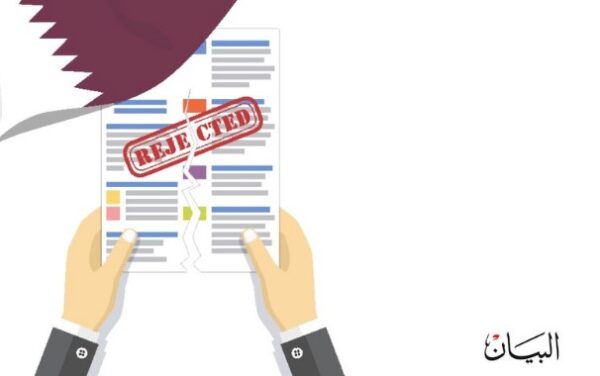 Saudi Arabia, the United Arab Emirates (UAE), Bahrain, and Egypt severed diplomatic relations with Qatar over its alleged support of terrorist organizations. The quartet cite Qatar’s close relations to Iran, which competes with Saudi Arabia for regional influence and has been accused of supporting extremist groups in Lebanon, Iraq, and Yemen.
Saudi Arabia, the United Arab Emirates (UAE), Bahrain, and Egypt severed diplomatic relations with Qatar over its alleged support of terrorist organizations. The quartet cite Qatar’s close relations to Iran, which competes with Saudi Arabia for regional influence and has been accused of supporting extremist groups in Lebanon, Iraq, and Yemen.
Qatar’s support for the Muslim Brotherhood, which has been deemed a terrorist group, is also another point of contention between the Gulf states and Egypt. During the Arab Spring uprisings in 2011, Doha backed the exiled Muslim Brotherhood government under Mohamed Morsi, while Saudi Arabia staunchly supported military-backed Abdel Fattah Al Sisi.
Al Jazeera is another key point of dissent between Saudi Arabia and Qatar. In 2002, the Saudi government pulled its ambassador from Qatar after the news channel ran interviews that were critical of the kingdom’s ruling family. In addition, the news agency has been accused of providing a platform for extremist organizations such as the Muslim Brotherhood, as well as critical opinions of the region’s long-serving leaders. Doha has repeatedly denied the allegations as having “no basis in fact.”
June 18
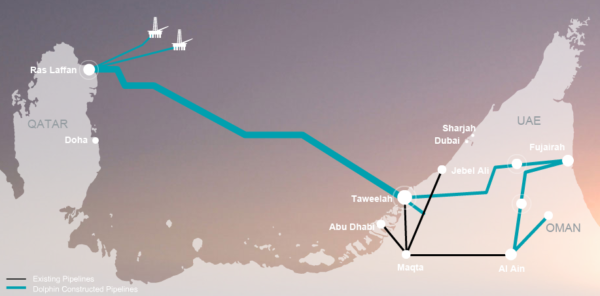
Qatar Petroleum CEO Saad Sherida Al Kaabi announces that the Dolphin Gas pipeline will continue to provide gas to the UAE, stating that despite the “force majeure” clause in the agreement (which would allow them to stop supplying gas if they wanted), Qatar does not wish to cause any problems for the people of the UAE.
June 19
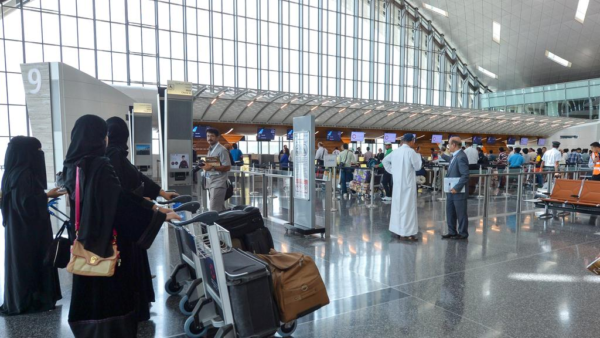
This date marks the deadline for all Qataris in the blockading countries to leave those respective countries. In addition, the blockading countries also order their citizens to return from Qatar.
June 21
The U.S. State Department questions the motives of Saudi Arabia and the United Arab Emirates for their boycott of Doha, saying it was “mystified” the Gulf states had not released their grievances over Qatar. In Washington’s strongest language yet on the Gulf dispute, the State Department said the more time goes by, “the more doubt is raised about the actions taken by Saudi Arabia and the UAE.” The State Department’s comments came in contrast to the language taken by U.S. President Donald Trump who has accused Qatar of being a “high level” sponsor of terrorism. Saudi Arabia, the United Arab Emirates and Qatar are key American allies.
June 22
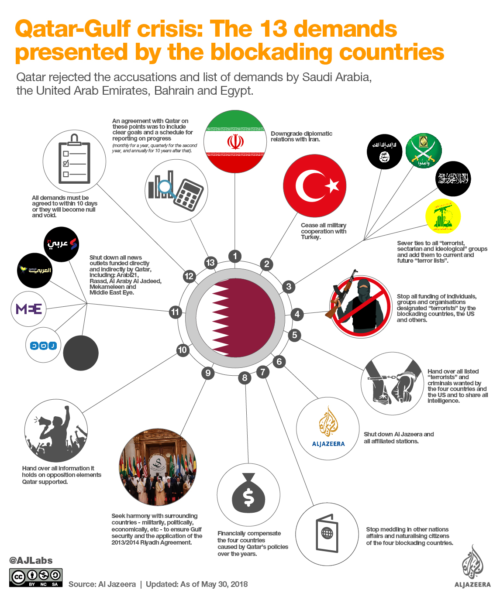
July 10
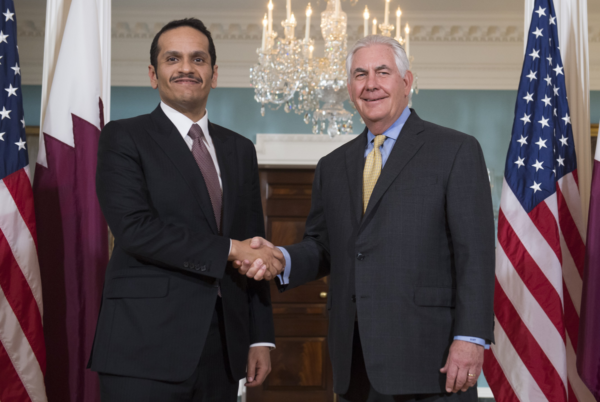
U.S. Secretary of State Rex Tillerson visits Kuwait, Qatar and Saudi Arabia in an effort to find a solution for the ongoing blockade. He mentions that the blockade has consequences at the humanitarian level as it disrupts the fight against Daesh. Here, he poses with Qatar’s deputy prime minister and minister of foreign affairs, Mohammed bin Abdulrahman bin Jassim Al Thani.
August 9
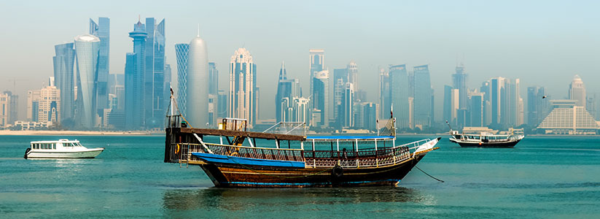
Qatar announces visa-free entry for citizens from 80 countries in order to to encourage tourism and air transport during the blockade as part of an effort to make Qatar the most open country in the region.
August 25
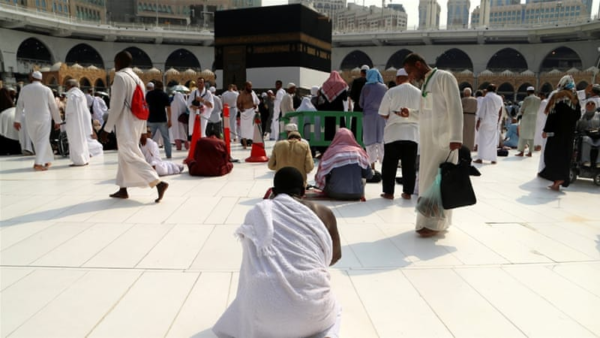
Muslims from Qatar are unable to travel to Saudi Arabia to perform Hajj.
December 5
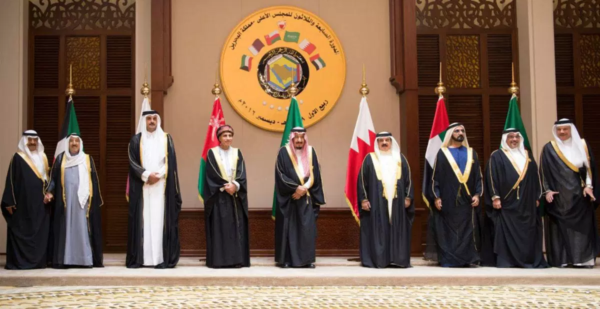
The annual GCC summit, originally scheduled for two days, ends just a few hours after it begins. Of the six countries, only the heads of state of Kuwait and Qatar were present, with Saudi Arabia, Bahrain and UAE only sending ministers and deputy prime ministers to the meeting. UAE also announces a new partnership with Saudi Arabia, separate from the GCC, involving increased military and trade cooperation.
December 19
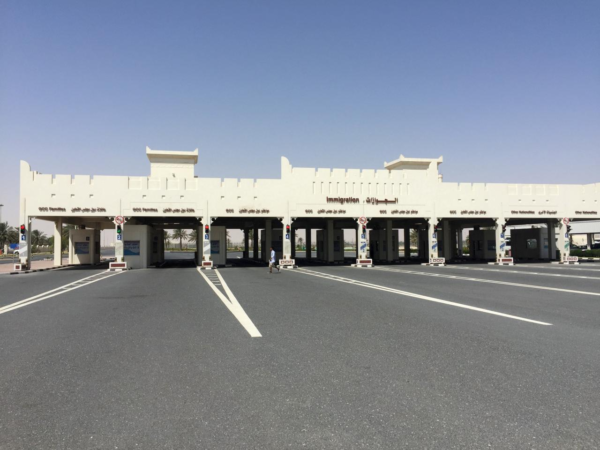
Saudi Arabia ‘permanently’ closes its land border with Qatar.
2018:
February 26

At the 37th session of the UN Human Rights Council in Geneva, Qatar’s foreign minister urges the UNHRC to stop the blockade against Qatar: “I call upon the Human Rights Council and all its mechanism bodies to take up their responsibilities and stop the unilateral measures taken by some states against the population of Qatar, and put an end to this racist course of action.”
March 3
The State Department has approves a possible $270.4 million missile sale to the United Arab Emirates and a $197 million upgrade for Qatar’s air operation center, even as Gulf countries continue to impose a blockade on Doha. The proposed sale to the UAE Air Force includes 300 Sidewinder Block II missiles and associated parts and contractor support from Raytheon, according to a Thursday announcement from the Defense Security Cooperation Agency (DSCA), which oversees foreign military sales.
March 25
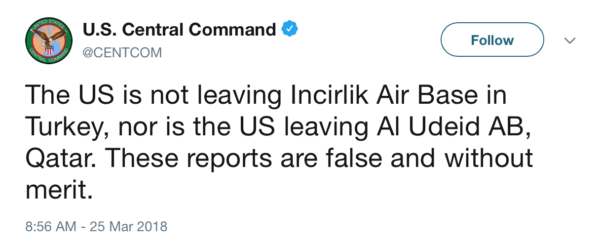
U.S. Central Command (CENTCOM) denies false reports of its leaving the Al Udeid base in Qatar.
March 26
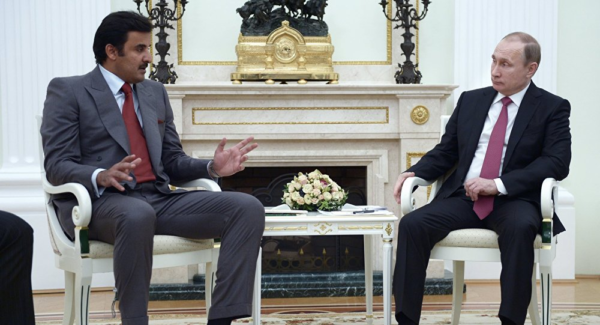
Qatar’s leader, Emir Tamim bin Hamad Al Thani, meets with Russian President Vladimir Putin in Moscow.
April 3
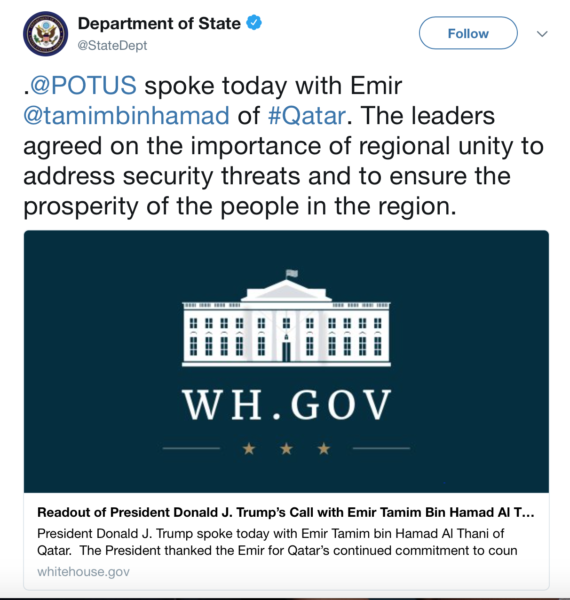
April 10
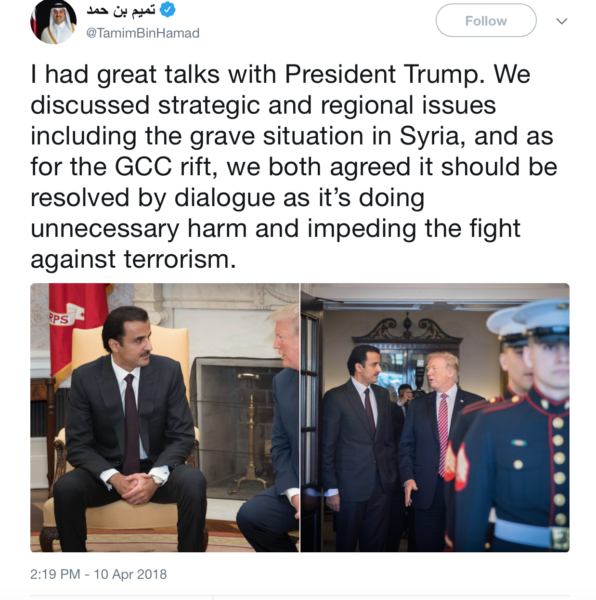
Emir Al Thani meets with Trump at the White House to discuss the Gulf crisis. Trump says “we are working on unity in that part of the Middle East and I think it’s working out very well; there are lot of good things happening.”
April 22
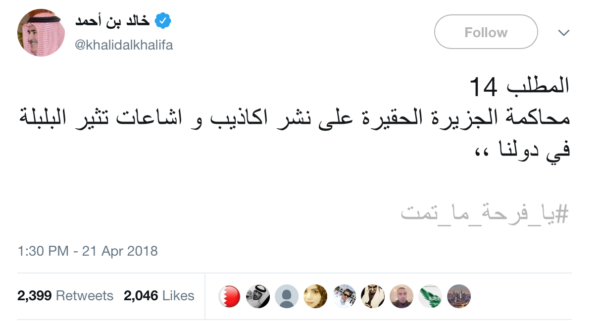
Bahrain’s Foreign Minister Khalid bin Ahmed Al Khalifa tweets his “14th demand,” requesting the prosecution of Al Jazeera for “spreading lies and rumors that cause confusion.”
April 23
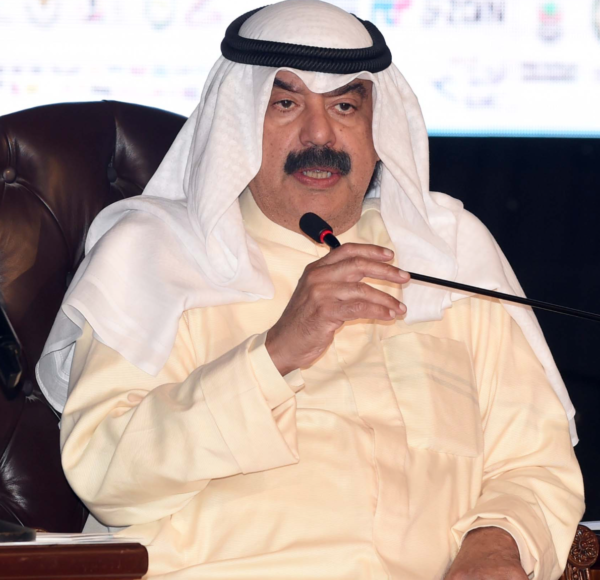
Kuwait Foreign Minister Khaled Al Jaralleh reports, “Kuwait and the Arab Gulf countries were determined to solve the crisis.” He further claims that a US-GCC summit might be held in September to finally end the deep division among GCC states.
April 29
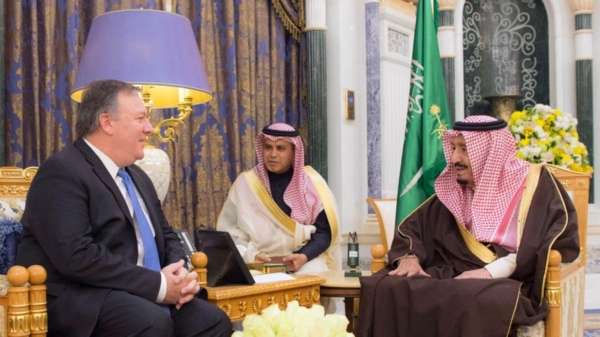
U.S. Secretary of State Mike Pompeo urges Saudi officials [Crown Prince Mohammed bin Salman, King Salman (pictured, right), and Saudi Foreign Minister Adel al-Jubeir] to resolve the rift in the Gulf during a visit to Saudi Arabia.
June 4
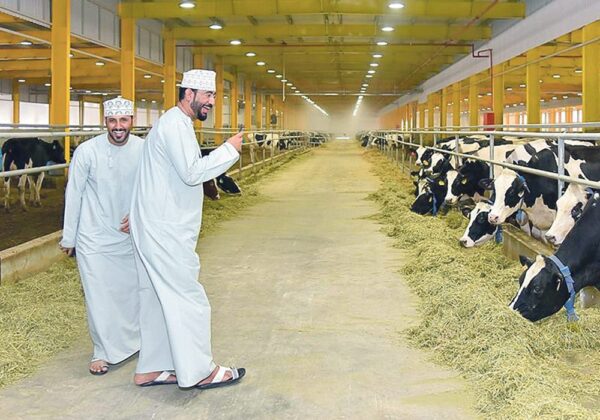
To overcome the challenges created as a result of the blockade, Qatar increasingly turns to Iran and Turkey — two countries listed in the 13 demands, purportedly for their destabilizing interference in regional affairs — to meet their needs. Iran and Turkey provide essential food items, airspace and trade partnerships, helping to ensure the small country stayed afloat in the the months after the imposition of the blockade. Trade with Iran has actually increased over the past year to $2 billion dollars, while for the first time, Turkey became a part of Gulf security, through its military presence in Qatar.
In further defiance of the quartet’s attempt to economically isolate Qatar, because of its oil wealth, the rich country has been able to invest in atypical industries, such as dairy, beef and agriculture, in order to reduce its dependency on food imports and increase its food security. Above, staff at Baladna Farm check out some of their herd of Holstein cows; the farm hopes to acquire 14,000 cows and eventually supply all of the dairy for Qatar’s 2.6 million people — an increase from the 40% it provided in January 2018. Qatar’s independence and resilience in spite of the blockade has been a source of continued frustration to those behind the blockade. Photo: Baladna Farm.
June 5
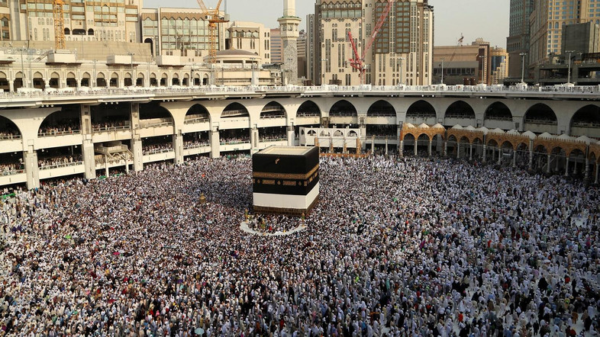
Saudi Arabia’s Ministry of Hajj and Umrah announces that it welcomes Qatari citizens to perform Umrah rituals this year, after legally registering for it upon arriving at Jeddah’s airport.
June 7th
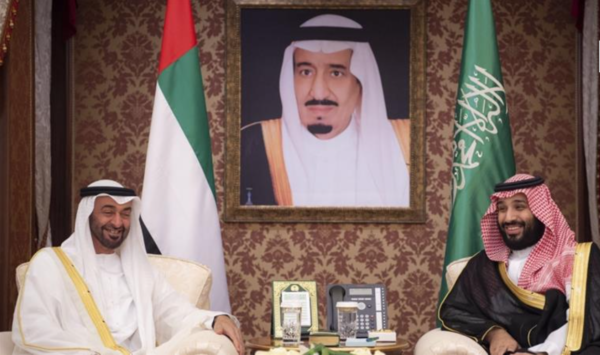
In in the first meeting of the Saudi-Emirati Coordination Council, Saudi Crown Prince Mohammed bin Salman meets with Sheikh Mohammed bin Zayed, crown prince of Abu Dhabi, to discuss their the new military and trade alliance. HH Mohamed bin Zayed tweets at the conclusion of the meeting, “we [Saudi Arabia and the UAE] are committed to strengthening cooperation & continuing our constructive approach. Our alliance with KSA is a strategic choice that increases our strength & provides both countries a promising future. We’re keen to form a nucleus that brings all Arabs together.” The new council points to the erosion of ties that once conjoined the 6 members of the GCC.
June 11
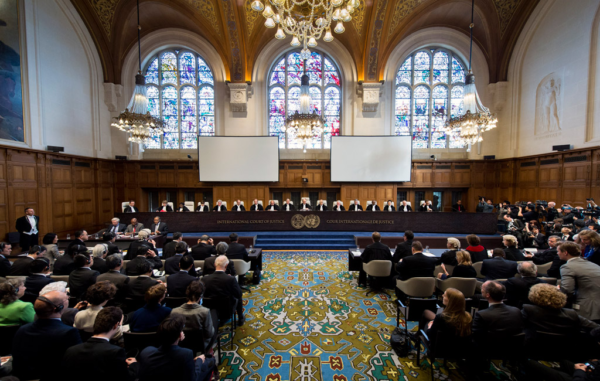
The government of Qatar takes the United Arab Emirates (UAE) to the UN International Court of Justice over what it describes as human rights violations, accusing the Emirates of fostering an “environment of hate” against Qataris. according to the official Qatar News Agency QNA). “Historically the people of Qatar and its neighbors have been close. For decades Qataris and Emiratis have worked together, prayed together and married into each other’s families,” said Mohammed Al-Khulaifi, Qatar’s lawyer. “Despite these close ties” the UAE implemented a “series of broad discriminatory measures against my country and its people on the basis of their Qatari nationality,” he told the 16-judge bench at the tribunal.
June 21
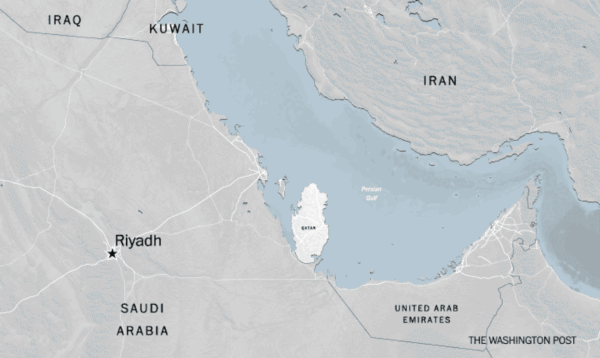
Rumors first reported in April that Saudi Arabia plans to cut a canal along its 38-mile border with Qatar — and transform the tiny emirate from a peninsula into an island — gain traction with reports of project bids. The Washington Post states, “It is an ambitious idea that would turn one of the Middle East’s symbolic divides into a geographic reality.” Some suggest the announcement is merely a PR stunt meant to spread psychological terror among Qatar’s 2.6 million citizens. The cost of the project is estimated at 2.8 billion Saudi riyals, roughly $745 million, a steep fee for a country in the midst of a dramatic economic reform. Bids for the project closed on June 25th with a winner allegedly to be announced within 90 days.
Comment: Why does this matter?
The GCC countries have been a stabilizing economic, political, social and military force in the Middle East. The Qatar crisis marks a substantial rift among Gulf monarchies and threatens a historical alliance between nations. Qatar’s perceived support of Brotherhood affiliates, coupled with Al Jazeera’s coverage of the Arab Spring uprisings in Egypt embittered its GCC partners. In fact, Al Jazeera was accused of providing a platform for Brotherhood members and sponsoring terrorism. With regards to the geopolitical rivalry between Iran and Saudi Arabia, the rift pushes Qatar and Iran closer together. The implications of the crisis disrupt not only top-level relations, but also permeates to the citizens of Gulf nations where one witnesses embroiled hatred towards the other. The United States and its allies rely on the Gulf, its global market, and established military bases to promote its interests and influence throughout the Arab world. Thus, the Gulf Crisis threatens regional stability and, as a result, the U.S.’s relations with its longstanding ally.
In response to the land, sea, and air blockade, Qatar expanded its diplomatic strategies to address its food shortages and alternative air routes. Overnight, Doha established new trade routes and enhanced existing ones with Oman, Turkey, Iran, India, etc. The United States plans to expand the Al-Udeid airbase, the biggest American military base in the Gulf, in an effort to reaffirm the base’s military-strategic importance. The Arab Center Washington DC (ACW) released a publication on the Gulf Crisis entitled, The GCC Crisis at One Year: Stalemate Becomes New Reality; the book discusses the severe repercussions of the GCC crisis, identifying three points that characterizes the current stalemate: the failure of mediation, the evolution of an alternate alliance, and the insistence on (as-of-yet) unmet demands. With the GCC-coalition of Saudi Arabia, the UAE, and Bahrain, and a fourth, Egypt, expressing no interest in reconciling and rebuilding relations, the crisis threatens the GCC alliance that has endured since 1981.
Questions for further exploration
- Why do you think the four countries continue their economic and diplomatic boycott of Qatar?
- How would you solve the crisis?
- What role should the United States play in ending the dispute?
- Why do you think Saudi Arabia wants to turn Qatar into an island? Will this move actually happen or is it just a threat?
- One motivation for the quartet’s actions is that Qatar behaves too provocatively and undermines regional stability. What are other examples in one country (or more) has tried to use economic and diplomatic pressure to get another country to fall in line with its preferred policies? What are examples when sanctions or boycotts have failed or succeeded?
Sources
The 13 demands on Qatar from Saudi Arabia, Bahrain, the UAE and Egypt (The National, June 2017)
US State Department questions Gulf motives on Qatar boycott (CNBC, June 2017)
The fake-news hack that nearly started a war this summer was designed for one man: Donald Trump (Quartz, October 2017)
Trump administration to Saudi Arabia: Get over your problems with Qatar (CNBC, April 2018)
GCC crisis at deadlock one year on (Al Jazeera, June 2018)
Gulf crisis: Qatar takes dispute with UAE to International Court of Justice (Business Standard, June 2018)
The Gulf crisis: How it all started (Al Jazeera, June 2018)
Qatar crisis: 4 Arab countries with varied grievances (The National, June 2018)
UAE, Saudi hold first meeting of the two-nation council (Al Jazeera, June 2018)
Qatar-Gulf crisis: All the latest updates (Al Jazeera, July 2018)
The Official Twitter Account of Crown Prince of Abu Dhabi
Additional Resources

